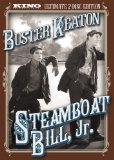| Reviews & Columns |
|
Reviews DVD TV on DVD Blu-ray 4K UHD International DVDs In Theaters Reviews by Studio Video Games Features Collector Series DVDs Easter Egg Database Interviews DVD Talk Radio Feature Articles Columns Anime Talk DVD Savant Horror DVDs The M.O.D. Squad Art House HD Talk Silent DVD
|
DVD Talk Forum |
|
|
| Resources |
|
DVD Price Search Customer Service #'s RCE Info Links |
|
Columns
|
|
|
Steamboat Bill, Jr.: 2-Disc Ultimate Edition
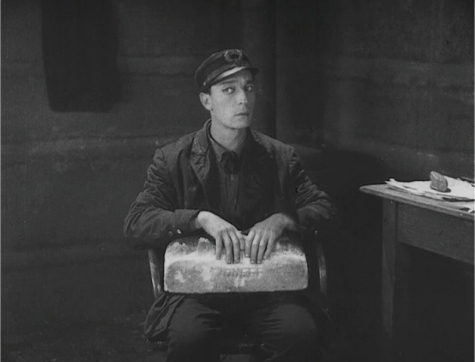
Bursting at the seams with slapstick, stunts and star power, Buster Keaton's beloved Steamboat Bill, Jr. (1928) is about as entertaining as films get, silent or otherwise. This story of a young man, his reluctant father and a creaky old steamboat starts small and finishes huge, culminating in a high-powered hurricane that literally wipes out an entire town. The steamboat in question is the Stonewall Jackson, and stiff competition arrives when a new luxury steamboat is unveiled by rival entrepreneur J.J. King. But the tough-as-nails William "Steamboat Bill" Canfield, Sr. (Ernest Torrence) won't give up easily: he's been running the Stonewall Jackson through Mississippi waters for most of his life. The same day, Canfield's son is due for a visit; they haven't seen each other in years, and the sea captain can't wait to see how his son has grown. Imagine his disappointment when William, Jr. (Keaton) turns out to be a scrawny, bookish young college boy with little interest in his father's trade. Nevertheless, it's up to both Bills to ensure that the Stonewall Jackson isn't run out of the water by King's powerful paddleboat.
Inevitably tied to Keaton's most enduring film, The General (due to their larger scales, similar subject matter and close release dates), Steamboat Bill, Jr. is anything but a rehash of old material in a new setting. Sure, there are still plenty of obstacles to overcome---inanimate and otherwise---and Keaton's character is still pining for the love of a young woman---in this case, J.J. King's daughter (Marion Byron)---but Steamboat Bill, Jr. uses a more close-knit atmosphere to get the job done. The relationship between William Canfield, Jr. and his lumbering father creates a great character dynamic: there's an initial sense of disappointment on both sides, but it's easy to see how father and son finally learn to accept one another. Though Bill Jr.'s love interest is given little to do, her initial reunion with the young man feels both natural and believable. Our stage is set quite nicely before the 20-minute mark, and Steamboat Bill, Jr. continues to crackle with entertainment for the remainder of the picture.
Of course, it goes without saying that the true highlight of Steamboat Bill, Jr. is the third-act hurricane sequence, during which a town's worth of buildings comes crashing down around our pint-sized hero. From his 45-degree walk against powerful winds to a building wall literally falling on him, Keaton carries this climax to blistering heights. Whether you've seen Steamboat Bill, Jr. dozens of times or haven't had the privilege yet, it's nearly impossible to make it through without gasping...or at the very least, grinning from ear to ear.
Originally released on DVD back in 1999 by Kino International, Steamboat Bill, Jr. returns with a 2-Disc Ultimate Edition that offers slight improvements across the board. Aside from a new audio track (available in 5.1 Surround and 2.0 Stereo mixes) and what appears to be a new transfer, we're also treated to a handful of appropriate bonus features, including an alternate "Killian Shows Archive Version" pieced together from variant takes and camera angles [NOTE: the original version on Disc 1 is referred to as "The Keaton Estate Version"]. While the creation of an alternate edition may have been a fairly common practice during the silent film era, it's especially nice to have both versions available in the same package. Let's take a closer look, shall we?
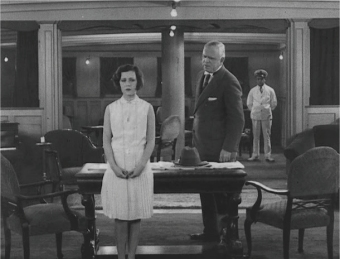
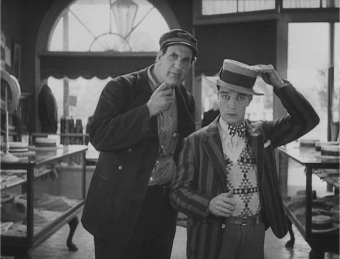

Presented in its original 1.33:1 format, Steamboat Bill, Jr. looks quite good for its age---and while the older DVD release was not on hand for direct comparison, the packaging on this Ultimate 2-Disc Edition states that both included versions have been mastered from archival 35mm materials. Any way you slice it, though, Steamboat Bill Jr. only looks as good as the source material will allow: the image is slightly unstable, dirt and debris are easily spotted and the black levels flicker quite often. Aside from these understandable issues, there's very little to complain about; digital problems (including edge enhancement, compression artifacts and ghosting) are kept to a strict minimum. A Blu-Ray release is also available---but for those with more modest setups, this is still a good-looking presentation.
Three different musical scores are included in this release, including a lively track by The Biograph Players in 2.0 Stereo and 5.1 Surround (available during The Keaton Archive version only). This is obviously a recent recording and sounds quite crisp, often filling the rear channels with plenty of added touches. Also available on the Keaton version is a Mono organ score by Lee Erwin, which fits the mood quite well despite being mixed a little low at times. The Killiam Shows version on Disc 2 includes a lively piano score by William Perry and omits the other two, but it's a fine track in its own right. It's odd that all three scores couldn't be made available during both versions (slightly different running times aside, of course), but that's just one more reason to appreciate the choice.
UPDATE: Eagle-eyed (and eagle-eared) reader Jeffrey Nelson has pointed out two interesting details. The first is that the 1970s-era organ score by Gaylord Carter---present on the previous Kino release and many prints of the film---has not been included here, so die-hand fans of that score may want to hang onto their old discs. The second is that, for many viewers, the "alternate version" on Disc 2 is actually the one that has been used for years...which includes, again, the previous Kino release and many prints of the film. In any case, both versions of the film are present here---and due to this title's strengths, it's still a fantastic release and no ratings have been changed.
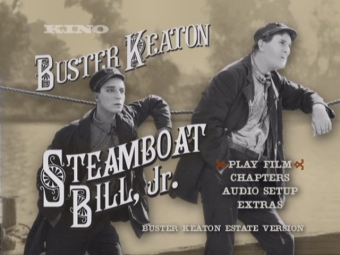
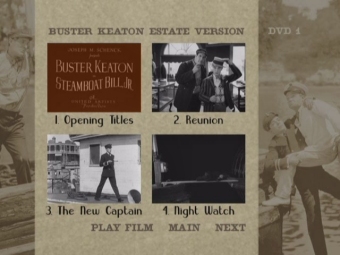
Disc 1 continues with a fairly stacked Photo Gallery filled with production stills and promotional artwork. Sadly, it's presented in 1.33:1 format and many of the photos are a bit too small to be appreciated. We're also treated to a pair of "Steamboat Bill" Songs (a 1911 recording by Edward Meeker and a 1919 recording by Irving Kaufman), from which the film originally borrowed its name. Last but not least is "Why They Call Him Buster" (1:11), a fairly entertaining highlight reel of Keaton stunts followed by a crummy commercial for Kino's Lost Keaton collection.
Disc 2 yields a fairly surprising bonus feature: the complete Killian Shows Archive Version of Steamboat Bill, Jr. (70:22, below right). Comprised entirely of alternate takes and slightly different camera angles (shot during a few of the stunt scenes which were only attempted once), it's basically the same film with a few visual differences. Interestingly enough, the total running time of this "alternate version" runs a few seconds shorter---but aside from the initial curiosity factor, only the most ardent Keaton disciples will notice much of a difference. On the visual side of things, the print doesn't look as clean and stable as Disc 1's Keaton Estate version, but it's still watchable. As for the audio, this is the only version with the piano score by William Perry, so fans should appreciate both options.
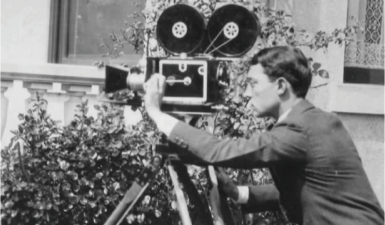
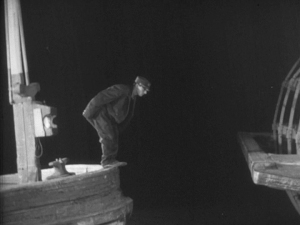

As one of the silent film era's last true classics, Steamboat Bill, Jr. remains as entertaining and exciting as ever on Kino's 2-Disc Ultimate Edition. Though Keaton's career would drastically change during the next few years, fans of all ages will enjoy the final independent film made during the prime of his career. Kino's reissue of this classic arrives with a few surprises, including a solid technical presentation and a small assortment of appropriate bonus features---not to mention an alternate version of the film itself, of course. Overall, this new Ultimate Edition of Steamboat Bill, Jr. should certainly give silent film buffs something to talk about. Highly Recommended.
Randy Miller III is an affable office monkey based in Harrisburg, PA. He also does freelance graphic design projects and works in a local gallery. When he's not doing that, he enjoys slacking off, second-guessing himself and writing things in third person.
|
| Popular Reviews |
| Sponsored Links |
|
|
| Sponsored Links |
|
|
| Release List | Reviews | Shop | Newsletter | Forum | DVD Giveaways | Blu-Ray | Advertise |
|
Copyright 2024 DVDTalk.com All Rights Reserved. Legal Info, Privacy Policy, Terms of Use,
Manage Preferences,
Your Privacy Choices | |||||||









